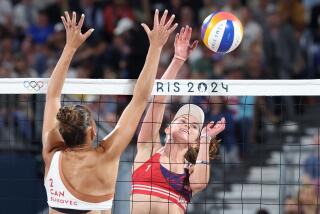More Investment, Less Reward : Volleyball: It’s harder than ever to build a top-flight U.S. team, and that team has found winning more difficult.
- Share via
The U.S. men’s volleyball team has been assaulted by a paradox: The more popular volleyball has become worldwide, the less success Team USA has enjoyed.
Time was, the United States had players such as Karch Kiraly and Steve Timmons and expected to win. Its opponents expected the same thing.
And top college players would sacrifice nearly everything for a chance to win an Olympic gold medal.
Times have changed.
The emergence of lucrative beach tournaments, as well as professional leagues scattered across Europe, has meant more opportunities for young players to stray from the U.S. program.
“Volleyball (has) taken off,” said setter Eric Sato, the only player remaining from the 1988 gold-medal team.
Fred Sturm, who left Stanford three years ago to coach the U.S. men, said that to build a team now, he must recruit.
“If someone comes out of college and gets an offer they cannot refuse, we lose that guy,” he said. “But if we sign a guy, it’s like getting a blue-chip recruit. . . . It gives the program a lot of credibility and continuity. A lot of younger players will see these guys signing on.”
That was the philosophy behind signing Bryan Ivie and Bob Samuelson to multiyear contracts.
Ivie, a 6-foot-7 middle blocker, signed an unprecedented four-year, six-figure contract that ends after the 1996 Olympics in Atlanta. Samuelson, a 6-5 middle blocker, signed for two years.
“It think it was just a matter of (the U.S. Volleyball Assn.) deciding, really deciding, where they wanted their program to head,” Ivie said. “To show the players that they want to build a team.
“They’re trying to get the players to stick around (and) train with the same unit.”
Ivie, 23, a two-time NCAA player of the year at USC, is the centerpiece of a team that will play Brazil at 7:30 tonight at the Forum as part of the $3-million World League.
“I think at this point, (Ivie is) comparable to any of the great big men,” Sturm said. “He’s good at very many things. But he still has a lot of room to improve.”
Ivie’s development is one of many keys for a team coming off a bronze-medal performance in Barcelona that left some players satisfied, others disappointed and everyone bald.
U.S. players shaved their heads after an opening-round victory over Japan was overturned by the International Volleyball Federation.
Twenty-four hours after the United States had seemingly won the match in five games, the federation ruled that the referees failed to award Japan a technical point after Samuelson’s second unsportsmanlike conduct call, a move that would have given Japan a four-game victory.
So the players shaved, in a show of team unity and a show of support for Samuelson, who has a condition that causes his hair to fall out prematurely.
“I think with the head-shaving, it brought that line between the veterans and the rookies together,” Sato said. “I thought it was good for American volleyball.”
Said Ivie: “It started out more as a joke, but turned into something more serious.”
The suddenly bald U.S. team won five consecutive matches before losing to eventual champion Brazil in the semifinals.
Seven players--all but Samuelson have grown back their hair--return from that team, including setter Dan Greenbaum.
“(This) team is a different team from 1992,” Sturm said. “(This) is going to be a year of transition for us in terms of players.”
Sato knows a lot about transition. The recent history of the team has unfolded in front of him--from Kiraly leaving the team to pursue other opportunities, to the head-shaving, to Timmons’ departure.
“I’ve seen it all change pretty drastically,” said Sato, 27.
The next three years represent the last chance at Olympic glory for many players, among them Sato.
“I want to end my career in Atlanta in ’96 with a gold medal,” he said.
For the U.S., it seems that winning the gold is the only real goal.
“That is the goal,” Ivie said.
More to Read
Go beyond the scoreboard
Get the latest on L.A.'s teams in the daily Sports Report newsletter.
You may occasionally receive promotional content from the Los Angeles Times.






